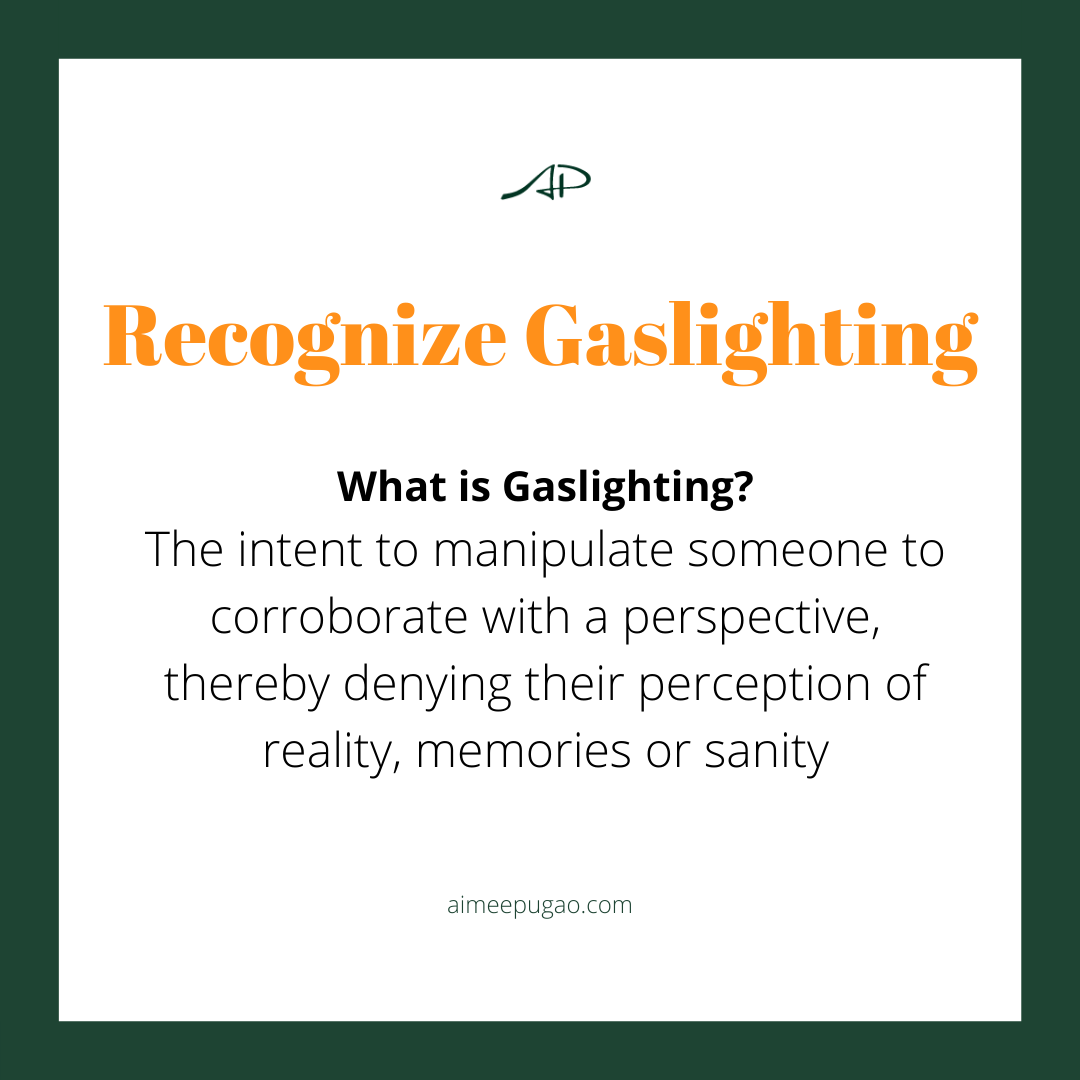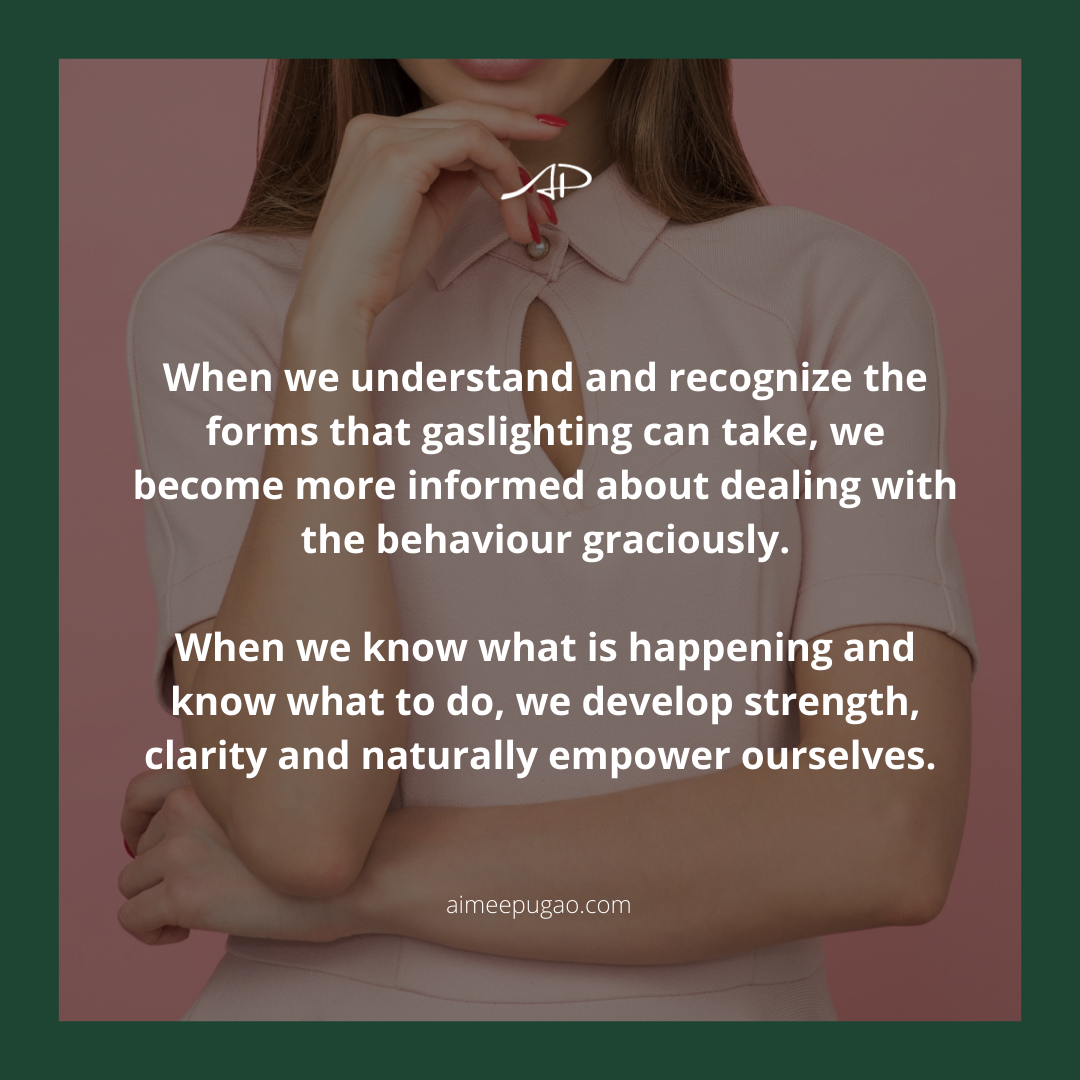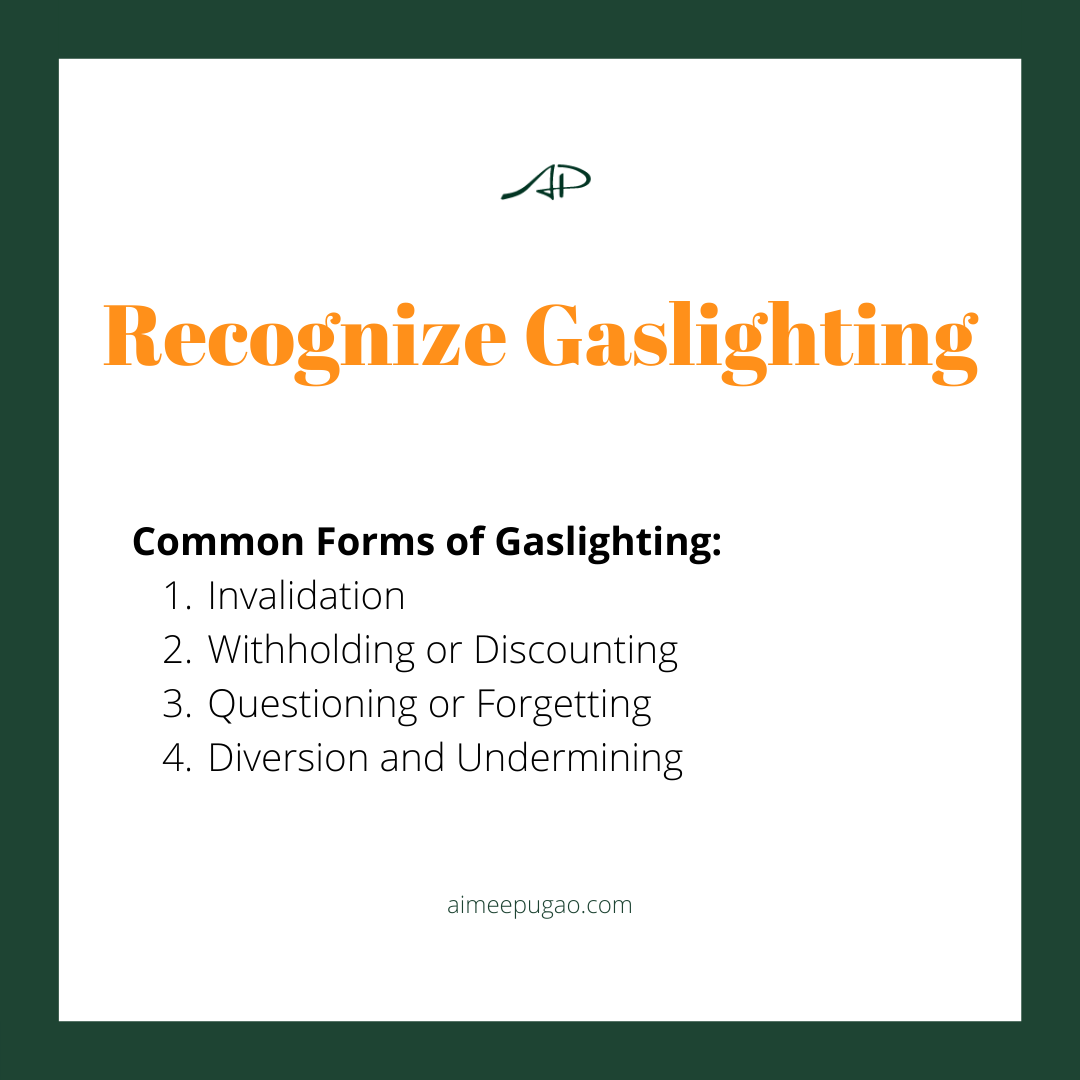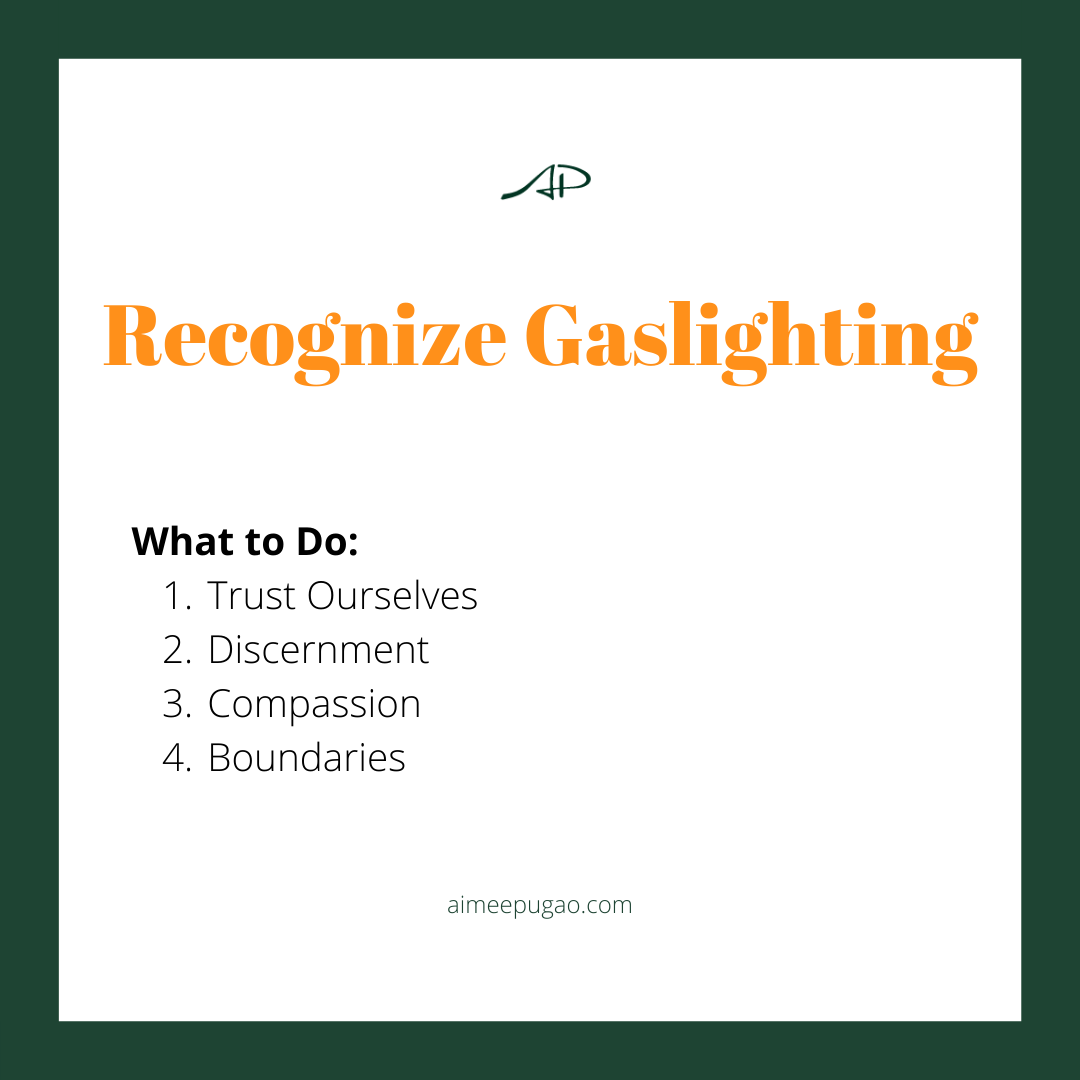We all have experienced gaslighting before. Maybe we didn’t have a word for it or understand what was happening. Perhaps we’ve done it to others without realizing what we were doing or its harmful effects.
What is Gaslighting?
The term gaslighting is used as a catch-all phrase to describe an array of tactics that intend to manipulate someone to corroborate with a perspective, thereby denying their perception of reality, memories or sanity.
Gaslighting is used to covertly emotionally and verbally manipulate someone, and it is a form of covert emotional and psychological abuse.
Gaslighting can be intentional or not, but regardless, it is manipulation. It can happen in many types of relationships, including those with bosses, coworkers, friends, family members, and relationships. It’s especially harmful when gaslighting is done by someone close to us, where we believe trust should be present.
Impacts of Gaslighting
Those of us who often experience gaslighting feel confused, anxious, and unable to trust ourselves. If we have often been gaslighted as children and young adults, we are more prone to experience it as adults since we have normalized this type of behaviour. We might not even be aware that we have been gaslighted and assume that it is part of everyday communication’s common confines. It is necessary to understand the forms that gaslighting can take to recognize, understand it and perhaps call it out, and heal from it.
Common Forms of Gaslighting
Gaslighting can take many forms. The forms mentioned below can also be used singularly or combined with several other forms.
Invalidation
When someone professes or asserts that we are overreacting to their hurtful behaviour, this form of gaslighting can condition us into believing our emotions are invalid or excessive.
Example: A person confronts her partner about her flirting with the server in front of her. She refuses it, telling her- she’s the one who’s imagining it, overreacting, and shuts down the attempt to converse about the subject further.
Potential phrases include: “You’re so sensitive.” “You imagine things.” “It’s all in your head.” “What are you talking about?”
Withholding or Discounting
Withholding information, refusing to listen to any of our concerns or pretends not to understand them.
Example: A man tells his ex-wife that she is neglecting and avoiding child care responsibilities and forgets or packs unhealthy school lunches for their son. She responds by refusing to acknowledge that it is even happening.
Potential phrases include: “I don’t have time to listen to this nonsense. You’re not making any sense.” “Are we talking about this again?” “I don’t want to talk about this; we are going in circles.”
Questioning or Forgetting
Pretending to forget, deny making promises, denying the events occurred in the way we (accurately) remember. The offender may also invent details that did not occur to discredit our memory.
Example: A brother often takes possessions from his sister’s room without her permission. She finds an item missing from her desk, which she later spots in his bag. She confronts her brother about it, and he tells her, “Don’t you recall letting me borrow it earlier?”
Potential phrases include: “I heard you say it. You never remember our conversations correctly.” “What are you talking about? I never promised you that.”
Diversion and Undermining
Diverting the conversation into an argument about our or other sources’ creditability or undermining the possibility of our reality.
Example: A man finds shrimp tails in his cereal box and notifies the company. The company tells him it’s an accumulation of sugar and refuses to acknowledge the possibility of the cereal accidentally containing shrimp tails.

Potential phrases include: “Have you been reading those articles online? They are always putting these crazy ideas in your head.” “It’s not possible that can occur.”
Different Perspectives Verses Gaslighting
We can indeed all have different perspectives of the same event. However, if a person is willing to discuss the matter further and offers understanding, concern and empathy, it is likely not gaslighting. At the end of a conversation, both parties should feel relieved, and it is possible to agree to disagree respectfully.
Gaslighting vs Occasional Bad Behaviour
Occasionally all of us exhibit bad behaviour; let’s ask ourselves, is this pattern? or does it rarely occur? If the gaslighting rarely happens, then an acknowledgement and apology may ensue with time.
If gaslighting happens often, it becomes a behaviour pattern, and it is unlikely the person will change their manipulative tendencies. People who commonly gaslight function in this world based on power and control, not respect and reciprocity. It is unrealistic to believe we can change how others choose to operate in this world. If people want to change, they must come to that conclusion on their own.
What to Do
When someone chooses to use the forms of Gaslighting through Invalidate, Withholding or Discounting, Questioning or Forgetting, or Diversion and Undermining, we can choose to:
Trust Ourselves
We can respond knowing we have the right to have a different reality and perspective than someone else. Trust how we feel about the situation, honour our feelings without worrying too much about being oversensitive. If we feel like something is peculiar or strange, we are probably right to some degree.
If someone reacts in a manner that further exacerbates the concern, it may be a good idea to reconsider how we interact in that relationship.
Discernment
We can recognize the behaviour, what is occurring, and discern whether the behaviour is appropriate. When we discern, we know what is beneficial for us and what isn’t without condemnation. Emotionally healthy people (also known as Safe People) will tend to interact with us in a manner that ensues closeness, comfort, and concern.
Compassion
It’s unnecessary yet understandable that we add shame, judgment, anger, condemnation, or hostility towards those that gaslight us. However, these emotions deplete our energy. When people gaslight us, it’s not personal; other people’s behaviour is about where they are in their lives and is about their limitations. Provide compassion to their path in life and their struggle.
Boundaries
Boundaries set a clear line between what we will accept from others and what we will not. It helps to state our boundaries overtly.
Examples:
“I saw you were flirting with our server, and this isn’t the first time I have felt this. If you continue to ignore or divert my concern, next time I notice you flirting with the server, I will have to leave and go home.”
“I don’t recall letting you borrow my possessions, I’ve noticed you tend to blame my memory, but I don’t believe I’m that forgetful. Suppose I see you with anything an item of mine again, which I did not give you permission to use. I will have to start locking my bedroom door, so you no longer have access to my things.”
The other party also chooses to either abide by our boundaries and adapt their behaviour or end the relationship and walk away.
We can have many types of relationships with people who tend to gaslight. However, making people with gaslighting tendencies our close confidants or partners would make our lives difficult, and it would be far too painful.
Benefits of Recognizing Gaslighting
When we understand and recognize the forms that gaslighting can take, we become more informed about dealing with the behaviour graciously.
When we know what is happening and know what to do, we develop strength, clarity and naturally empower ourselves.
We’ll find those who tend to display gaslighting behaviours will stop doing so or cease to be part of our lives.







